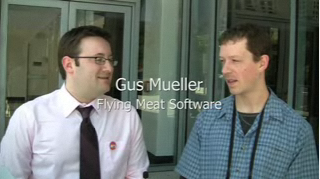Ars Technica's Clint Ecker sat down with Gus Mueller of Flying Meat Software this past Wednesday to talk about his company, his products: Voodoo Pad, Fly Sketch, and Fly Gesture, as well as how the independent developer life is treating him and other topics. Click the play button above to watch the entire interview.
NB: This interview marks our first attempt to use an alternate recording method. While it did produce superior sound quality, it looks like we were having a serious issue with parts of the sound from the interview being lost from the device. In those instances when good audio was lost, we've attempted to replace it with the less-than-stellar audio from the camcorder. I apologize for the harshness of the transitions, but we felt that this was a good interview and some good audio is better than nothing.
Update (6/27/2007): Transcript has been added! Read the transcript after the jump.
CE: We're here with Gus Mueller for Flying Meat Software. Hi Gus.
GM: How it's going?
CE: Pretty good. We're going to be interviewing you today about your software Voodoo Pad, Fly Sketch, Fly Gesture and just talking about development in general.
So the first thing I want to ask is, Voodoo Pad is probably one of your biggest products, right?
GM: Yes.
CE: What did you set out to make Voodoo Pad? What was your goal for it? I know it's kind of evolved into a lot of different things to a lot of different people? How did you set out?
GM: When I originally started it, I was just playing around with some Cocoa technologies and I found out I could do links in the text widget and I said "This is pretty cool," and I had my own peronal wiki online. And I put one and one together and I was like "I'll just make a little wiki here," cause I like Cocoa so much better than having to click edit. And I started doing that and I had something that night working. And then a couple weeks later I added some more and sent it out and some people liked it and I said "Oh, feedback!" And eventually it just snowballed from there.
CE: So what do you consider the application to be? Do you consider it to be a Wiki or a text editor or...
GM: It's everything!
CE: It's everything.
GM: It's a text editor first. I've got all the rich text formating in there, you can have images, you can have tables and lists and stuff like that. The wiki stuff is a very, very, very close second to that.
CE: Okay. Building off that, what have you found is the most creative use you've heard of? I know I've heard of some creative things, I'm sure you've heard of a lot more.
GM: Well the ones that make me happiest are people doing research with it, like PhD students who just think it's perfect...
CE: ...to link up all the different...
GM: Yeah, but people do some funky websites with it too, because you can export to the web.
CE: I actually used Voodoo Pad when you first came out with it in college to take notes and stuff. It really helped me out.
GM: Yeah, a lot of students use it.
CE: You went independent... two years ago?
GM: Yeah, it's just a little over two years ago.
CE: So how has that been so far? Is it still working out for you?
GM: Oh it's been great. Yeah, it's working out fine.
CE: Do you still think there's space for developers who haven't gone independent to still do that?
GM: Oh absolutely. There's so many more Mac users coming along every year. And just more of those people are buying software. And we're seeing a lot more of the same apps nowadays than we used to, but that's fine because there's more users. Competition is awesome.
CE: What would be the one biggest piece of advice, besides the goals thing you told us about, for people who are looking to make that crossover into independent development?
GM: Just make sure what you're doing, you're putting some passion into it. Cause that's going to make sure that you're not going to burn out that way and you're going to be able to make a good product that way.
CE: You have three pretty mature apps: Voodoo Pad, Fly Sketch and Fly Gesture. Do you find that it's more exiting and fun or interesting for you to have three mature apps and work on those day-to-day and adding incremental features, or to be in that stage where you're starting something from scratch like we talked about with Voodoo Pad, or working with new stuff and building it out from the beginning, but where it might not be as stable and you're working out a lot of bugs?
GM: Right. One of great things about having three apps is if I get tired of doing one thing, I can move to the other. I really do like starting out new apps, it's awesome. And even adding new features is like writing a new app sometimes. I love doing it, but eventually I get tired, but that's okay cause I can move onto this other thing. So it creates this nice little cycle.
CE: Do ever get a chance, like today, are you still coming up with new ideas and putting together little things?
GM: Yeah. My projects folder is littered with tons little things. And some of them are going to bubble up and make something.
CE: Cool. I think that's all the questions we have for today.
GM: Cool
CE: Thanks for talking to us.
GM: No problem.
VO: We'd like to thank Gus Mueller again for taking time out of his schedule to talk to us. Keep your eye on ArsTechnica.com for more updates from WWDC throughout the week.

reader comments